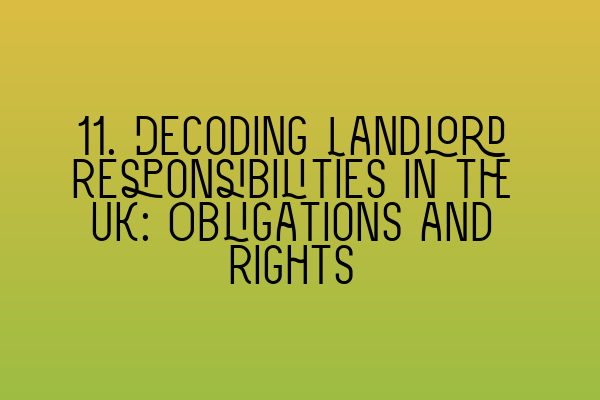Decoding Landlord Responsibilities in the UK: Obligations and Rights
As a tenant in the UK, it’s crucial to understand the responsibilities and rights of your landlord. From maintenance and repairs to safety regulations, knowing what your landlord should handle and what falls under your jurisdiction can help you make the most of your tenancy. In this blog post, we will decode the landlord responsibilities in the UK, providing you with essential information to navigate the landlord-tenant relationship effectively.
1. Property Maintenance and Repairs:
One of the primary responsibilities of a landlord in the UK is to ensure that the rental property is well-maintained and in a habitable condition. This includes addressing any necessary repairs promptly, such as fixing leaking pipes, repairing electrical faults, and maintaining the heating and ventilation systems.
2. Electrical Safety:
Landlords are also required to ensure that all electrical installations and appliances provided in the rental property are safe for use. This involves regular inspection and testing to comply with electrical safety regulations. If you suspect any electrical hazards, it’s essential to inform your landlord immediately.
3. Gas Safety:
If your rental property has gas appliances, your landlord must ensure that the gas installations and appliances are maintained in a safe condition. It is a legal requirement for landlords to arrange an annual gas safety check, conducted by a Gas Safe registered engineer. This inspection ensures that all gas appliances are operating correctly and do not pose a risk to your safety.
4. Fire Safety:
Landlords in the UK have a legal obligation to ensure that the rental property meets fire safety standards. This includes providing working smoke alarms, carbon monoxide detectors (if applicable), and fire extinguishers in communal areas. Regular testing and maintenance of these safety devices are necessary to ensure their proper function.
5. Energy Performance Certificate (EPC):
Before renting out a property in the UK, landlords must obtain an Energy Performance Certificate (EPC). This certificate rates the energy efficiency of the property and helps tenants make informed decisions about their energy usage and costs. Landlords are responsible for ensuring that the property meets the minimum energy efficiency standards outlined in the EPC.
6. Tenancy Deposit Protection:
If you rent a property on an assured shorthold tenancy in the UK, your landlord is legally required to protect your tenancy deposit in a government-approved tenancy deposit protection scheme. This ensures that your deposit is safeguarded and returned to you at the end of the tenancy, as long as you meet the terms of your agreement.
7. Right to Quiet Enjoyment:
As a tenant, you have the right to enjoy your rental property peacefully and without unnecessary disturbances. Landlords should not interfere with your privacy or enter the property without proper notice, except in emergency situations. If you experience any breaches of your right to quiet enjoyment, it’s advisable to communicate your concerns to your landlord and, if necessary, seek legal advice.
8. HMO Licensing:
If you live in a house in multiple occupation (HMO), your landlord may require an HMO license depending on the local authority regulations. Landlords of HMOs must comply with specific legal requirements, including maintaining adequate fire safety measures, providing sufficient sanitary facilities, and ensuring the property is not overcrowded.
9. Compliance with Health and Safety Regulations:
Landlords in the UK must comply with all relevant health and safety regulations that ensure the well-being of tenants. This includes providing safe and well-maintained common areas, proper waste disposal facilities, and ensuring that the property is free from hazards that may cause harm or injury.
10. Right to Request Repairs:
As a tenant, you have the right to request necessary repairs from your landlord. If your landlord fails to address these repairs within a reasonable timeframe, you may have legal grounds to take action. It’s important to maintain written records of your repair requests and any correspondence with your landlord to support your case if needed.
11. Eviction Procedures:
Landlords must follow a specific legal process if they wish to evict a tenant in the UK. They cannot force a tenant to leave without obtaining a possession order through the court system. It’s essential for both landlords and tenants to understand the eviction procedures and seek legal advice if necessary.
Understanding your rights and your landlord’s responsibilities is essential for a smooth tenancy experience. By familiarizing yourself with the obligations outlined in this blog post, you can ensure that your landlord fulfills their duties and that you are aware of your own responsibilities as a tenant.
If you would like further information on the SQE exams, you can check out the related articles below:
– SQE 1 Practice Exam Questions
– SQE 1 Practice Mocks FLK1 FLK2
– SQE 2 Preparation Courses
– SQE 1 Preparation Courses
– SRA SQE Exam Dates
Remember, if you encounter any issues with your landlord regarding their responsibilities or if you need legal advice, it’s always a good idea to consult with a qualified solicitor who specializes in property and land law.
Disclaimer: The information provided in this blog post is for general informational purposes only and should not be construed as legal advice.
